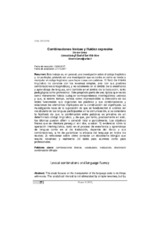Combinaciones léxicas y fluidez expresiva
Lexical combinations and language fluency

Ver/
Autor
Greco, Simone
Editor
UCOPressFecha
2017Materia
Combinaciones léxicasVocabulario
Traducción
Diccionario combinatorio bilingüe
Lexical combinations
Vocabulary
Translation
Combinatorial dictionary
METS:
Mostrar el registro METSPREMIS:
Mostrar el registro PREMISMetadatos
Mostrar el registro completo del ítemResumen
Este trabajo es, en general, una investigación sobre el código lingüístico y, en particular, pretende ser una investigación que se centra en cómo se tiende a manipular el código lingüístico para hacer cosas con palabras. El foco de interés lingüístico no coincide con los lexemas simples, sino con sus posibles combinaciones sintagmáticas, y no solamente en el ámbito de la enseñanza y aprendizaje de lenguas, sino también en el ámbito de la traducción, tanto pedagógica como profesional. Este propósito parte de una óptica que revela como meramente ficticia cualquier correspondencia interlingüística unívoca y que, al mismo tiempo, señala como imprescindible la detección de las redes funcionales que organizan las palabras y sus combinaciones y relacionan los elementos implicados en la construcción del significado. La investigación nace de la suposición de que es fundamental el análisis del vocabulario de las lenguas participantes en la comunicación, si se considera la hipótesis de que la combinación entre palabras es privativa de un determinado código lingüístico, y de que, por tanto, precisamente en esto, los idiomas pueden diferir o coincidir total o parcialmente. Los objetivos finales que se intentará perseguir son dos, a saber: 1) evidenciar cómo la operación interlingüística, tanto en el proceso de enseñanza y aprendizaje de lenguas como en el de traducción, depende del léxico y sus combinaciones, a fin de garantizar la eficacia del lenguaje en todos los niveles; 2) reflexionar sobre cómo compilar un diccionario bilingüe que resulte novedoso y realmente útil tanto para alumnos como para profesionales. This study focuses on the manipulation of the language code to do things with words. The analytical interest is not stimulated by simple lexemes, but by their possible syntagmatic combinations, not only in the field of language teaching, but also in that of translation, both pedagogical and professional. This objective is set in a perspective that reveals how any unambiguous interlingual correspondence is artificial, and that, at the same time, makes it essential to know how to identify the functional networks that organize words and their combinations, and relate them to the elements involved in building meaning. The study arises from the assumption that an analysis of the vocabulary of the languages involved in communication is fundamental, considering the hypothesis that the combination of words is privative of a given linguistic code and that, therefore, for this very reason, languages may differ or coincide totally or partially. There are two final goals: 1) to highlight how the interlinguistic operation, both in language teaching and in translation, depends on the lexicon and its combinations, in order to ensure the effectiveness of language at every level; 2) to reflect on how to compile a bilingual dictionary that is innovative and truly useful for both students and professionals.
